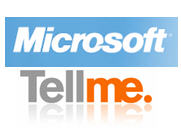Microsoft please Tellme: Will voice, Internet, software really become seamless?

Updated below: It's official. Microsoft is purchasing Tellme Networks. Financial terms weren't disclosed, but the price is expected to be about $800 million.

Here's Microsoft's official release and breaking news coverage. Microsoft will be holding a press event at 9:30 PST and we'll update accordingly.
The companies said:
Microsoft and Tellme share a vision around the potential of speech as a way to enable access to information, locate other people and enhance business processes, any time and from any device. Combining Tellme’s talented people and expertise in high-volume voice services with Microsoft’s platform, resources and worldwide customer reach will inspire new and innovative solutions.
Tellme provides voice systems for mobile search and automated voice-access systems.
Apparently, the big thing will be combining these voice systems to navigate the Internet and Windows better. It remains to be seen whether this technology works. I've spent some time using speech recognition software and it's hardly seamless. Meanwhile, when I call customer service numbers and get voice access systems I'm hitting prompts to get to a human. Tellme's robots may be nice, but humans are better.
Microsoft is undeterred. “We’ve made great strides in speech technologies, but have only scratched the surface of what is possible,” said Jeff Raikes, president of the Microsoft Business Division in a statement. “The acquisition of Tellme will bolster Microsoft’s existing speech capabilities, bringing both immediate and longer-term value to our customers and partners.”
The software giant noted that it has "enabled speech, handwriting and touch as forms of natural user input, making computing and digital devices easier to use." The rub: Folks still don't use these things en masse.
Will Tellme's voice technologies change things? For Windows Vista and Office I doubt it. Windows Mobile and Automotive and mobile search may be different stories. Unified communications may be the Holy Grail but adoption may be slow.
While it's not clear how much Microsoft paid for Tellme it's safe to say that the true returns won't appear for years to come.
See also: Om Malik's five things about the MS-Tellme deal.
Update 10:43 a.m. PT:
The conference call was semi-informative. Here are a few highlights:
Tellme has some scale. Company is profitable, but Tellme CEO Mike McCue didn't disclose figures. Last year Tellme processed "10 billion utterances." In a nutshell, the more speech the Tellme platform processes the smarter it gets. If you embed Tellme with all of Microsoft's products you could have one smart voice system.
Productivity software (Office) will have click-to-call features embedded in the future. Raikes said that the Tellme purchase will accelerate progress on that front.
Mobile applications will benefit the most from Tellme. McCue noted that Tellme already processes half of the directory assistance calls and takes calls for American Airlines and Domino's Pizza. Combine that capability with mobile search and smartphones you could have something nice.
Microsoft will define "Dialtone 2.0." McCue noted that the phone hasn't changed for decades. He envisions that instead of dialtone a phone should ask you: What you want to do? For instance, you could tell the phone to call mom and it would. Tell the phone to call two people for a conference call and it would. "From unified communications point of view it's exciting," says McCue.